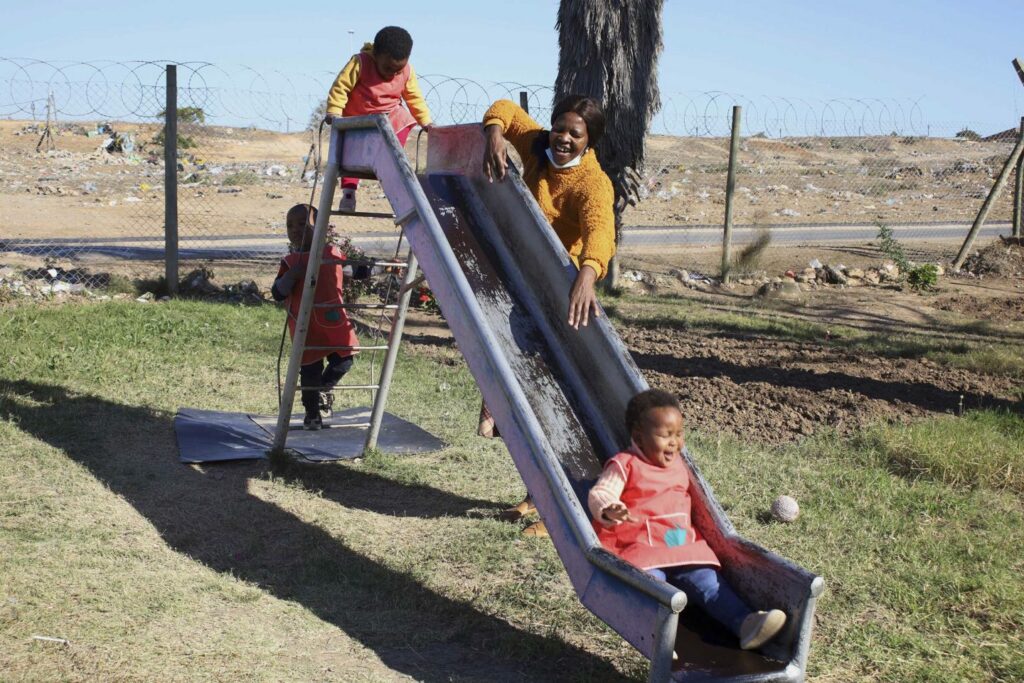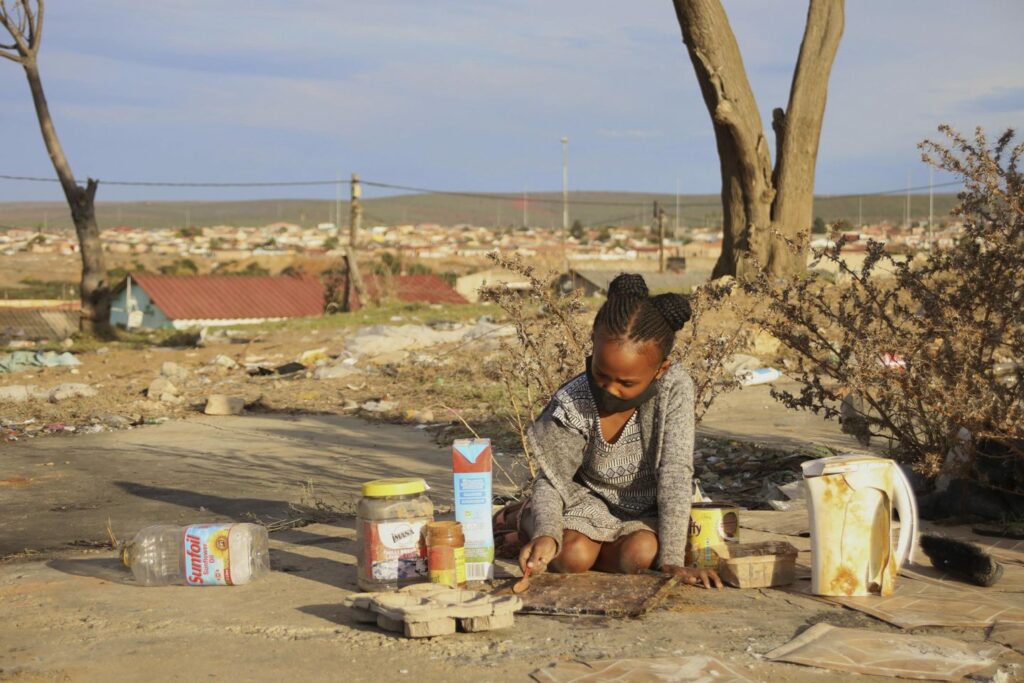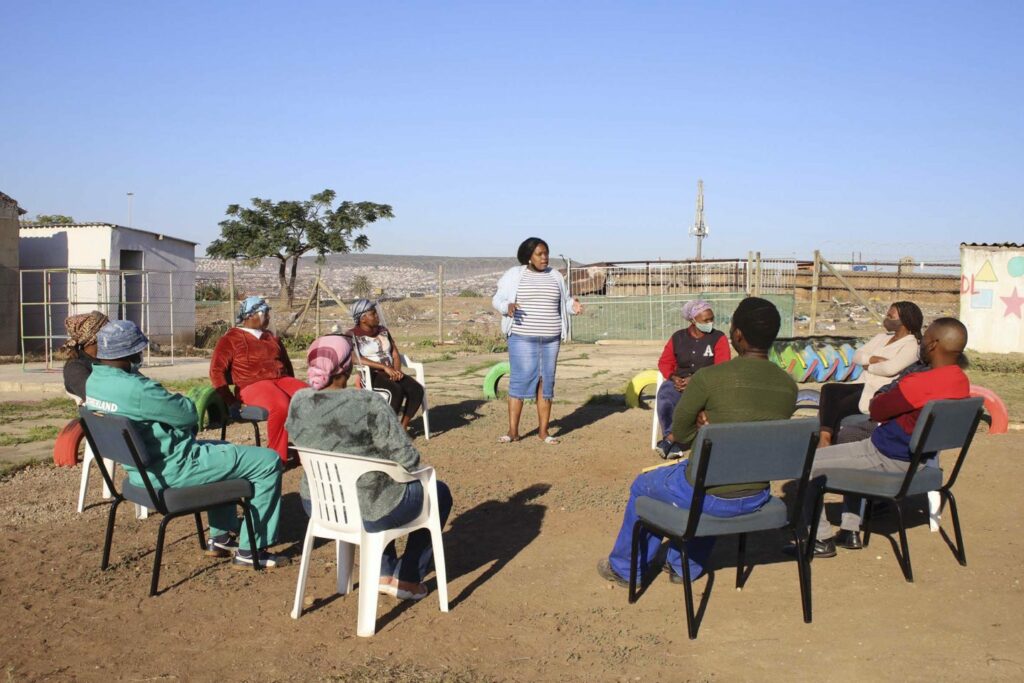15 June 2021: Former South African flyweight boxing champion, Vuyani Wonderboy Nene who is the most famous resident of KwaNobuhle township in Kariega, pulls a trolly outside the Sozama Pre-school where he is employed as a gardner and cleaner.
Pupils at Sozama preschool in KwaNobuhle township in the Eastern Cape are forced to use over-full classrooms, endure terrible smells from a nearby dumping site and often witness violence.
The preschool’s classrooms are in a hall partitioned into two rooms. A nursery is used for children under three and the other section is for those between three and five years old. Seventy-eight pupils are crammed into the space – and outside it is no better.
“Some residents throw old items, trash and dead dogs near the premises,” says Nosipho Magwa, 37, the principal of the preschool. “When the wind blows, all the dirty papers, plastic bags and cardboard fly straight into our yard. Sewage runs down Jolobe Street and passes our gate.
 Nombulelo Gladys Mbande, 55, is responsible for the nursery at Sozama preschool. The school is located opposite a dumping site where residents throw rubbish, dead dogs and used nappies.
Nombulelo Gladys Mbande, 55, is responsible for the nursery at Sozama preschool. The school is located opposite a dumping site where residents throw rubbish, dead dogs and used nappies.
“In summer, it becomes very bad. The worse thing is that, when the community punishes thieves, they beat them there in broad daylight while kids are watching. The screams and insults are unbearable for us as the staff, and the experience traumatises the children. If they are playing outside for instance, we have to run and bring them indoors so that they don’t see those graphic visuals.”
It’s not just the pupils of Sozama who are affected by the health risks of the dump site. With limited recreational facilities in the area, children close to the preschool play there too. Azingce Stuurman, 8, a grade-two learner, digs in the rubbish after school to find things to play with.
“I love baking cakes here. For my recipe, I use a spoon to mix water, milk (expired), oil, egg shells and soil. When the mud is soft and looks good, I put it in the sun, which is my stove. When it is dry, I play with it, then I go back home and come back again the next day,” says Azingce.
 Azingce Stuurman, 8, plays at the dump site opposite the preschool. She “cooks” using mud, water and what she finds in the rubbish. “If I had toys, I would not come here,” she says.
Azingce Stuurman, 8, plays at the dump site opposite the preschool. She “cooks” using mud, water and what she finds in the rubbish. “If I had toys, I would not come here,” she says.
No money in the municipality
Former principal of Alex Jayiya Primary School, Dolly Ntuntwana, who had retired from her teaching post, established the preschool in 1986. Initially, she operated the school from a garage on Jongilanga Street. The preschool was formalised in 1989, with a more solid structure that included a small hall, a kitchen, an office and toilets built on Jolobe Street.
According to Magwa, the school receives an early childhood development grant from the Department of Social Development but the number of children means the grant does not meet their daily needs. “We have about 78 children but only 40 of them are funded by the department. Though we get the stimulation, administration and stipend for two teachers, the funds are not enough. The parents sometimes don’t pay the fees. Most of them lost their jobs because of [the effects of the] coronavirus. Others depend on social grants. To accommodate them, I reduced the fees for this year,” says Magwa.
 09 June 2021: Children from Sozama Pre-school in KwaNobuhle township, Kariega play with pazzles inside a partitioned classroom. Most of the kids come from poor families where either both or a single parent is not working.
09 June 2021: Children from Sozama Pre-school in KwaNobuhle township, Kariega play with pazzles inside a partitioned classroom. Most of the kids come from poor families where either both or a single parent is not working.
Tembisa Mantewu, 35, who has a three-year-old child at Sozama, is among the parents who struggle to pay fees. “I have been unemployed for many years. The only money I rely on is the government social grant, which I get for my two children. I have to split it. Sometimes I buy food for the whole month, clothes for them and also pay the fees. When I run out of cash, I borrow from friends and neighbours and pay them back when I have money again.”
Little money, overcrowding and the smell of the refuse are not the school’s only problems. “Every year we buy new gas stoves and microwaves. At one point, criminals broke into our school and stole important items, including a thermometer … we use for screening people when entering the building. They know that we knock off at 4.30pm, then they remove whatever they can find in order to sell,” says a staff member at the school.
 10 June 2021: The principal of Sozama Pre-school, Nosipho Magwa, 37, of KwaNobuhle township in Kariega addresses members of the community outside the school’s premisses. The staff and SDB do not have the space to hold meetings because there is no available space for them within the building.
10 June 2021: The principal of Sozama Pre-school, Nosipho Magwa, 37, of KwaNobuhle township in Kariega addresses members of the community outside the school’s premisses. The staff and SDB do not have the space to hold meetings because there is no available space for them within the building.
Ward 47 councillor Nontuthuzelo Skweyiya of the ANC says budget constraints are the main reason the municipality does not fence the dumping site or otherwise help the school. “I once gave money before Covid-19,” says Skweyiya. “I am aware that they submitted another request recently but it is still in the municipal offices because it was never approved. But when I followed it up before [the Democratic Alliance (DA)] took over, I was told that the documents that contained their application for funding disappeared.
“I wish I can help them. In all the wards, we have a serious problem with dumping sites. Our municipality does not care. I am one of the committee members there. We raised this issue. When we discuss it, the officials always tell us that there’s no budget. All over the metro it is so dirty. I can take pictures and show you. When I drive past, I become very worried.”
DA chief whip of the Nelson Mandela Bay municipality, Morne Steyn, hadn’t responded at the time of publication to the question that was sent to him for comment on the allegations levelled by Skweyiya.
Changing the landscape
At the back of the preschool, a plot was given to unemployed residents to start a community garden. They planted beetroot, cabbage and carrots.
“We didn’t want to fold our arms during these harsh times,” says Siyabulela Ponki Cowa, 45. “Upon realising that everyone is affected by hunger, we discussed and formed a gardening initiative that would assist us to feed our families and hopefully we sell to other communities.
“Our aim is to encourage the youth to understand that agriculture is very important. You can’t buy everything in life. Some of us have small gardens at the back of our yards. We want to uplift the community.”
Another member of the initiative, Thembalethu Sizila, 33, says, “KwaNobuhle has a lot of problems. Water scarcity is one of them. The garden will never flourish without water. To prove that we have a serious crisis, the children here carry two-litre bottles of water every day, which they need for washing hands. We are all desperate for [water] as small-scale farmers. We are under-resourced and desperately need equipment. We have no funds to buy a JoJo tank, gardening tools and seeds. Our aim is to change the landscape and make it green again.”
This article was first published on New Frame